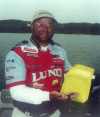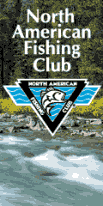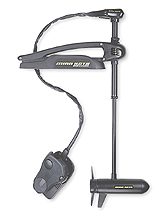
Click
here to Check out the New Leech Tamer and order online













Promotional
Team Favorites
Lodging food and more









|
Dream Boat or Nightmare?
By Ted Takasaki and Scott Richardson
A boat is a fisherman's tool chest. You can't grab the right tool at
the
right time if things are in the wrong place. "The user has to control
the systems of the boat. The systems can't control the user."That
wisdom comes from rigging expert, Jim Wentworth. His Minnesota-based company,
Fish Lectronics, has rigged boats for the likes of Ron and Al Lindner and
"Mr. Walleye", Gary Roach, for 30 years.
Wentworth is a physics professor. He brings that same scientific
approach to boat rigging. Like physics, the goal of proper rigging is to
make sense from chaos. "Rigging is the most critical phase of any boat,"
Wentworth said. "That's the time when things can get screwed up. This is
a very complicated subject."
Unfortunately, it's also often the phase of boat assembly that gets
the least attention. For one thing, many anglers fail to realize that
accessories and good rigging (trolling motors, kicker motors and fishing
electronics and batteries) can add $4,000 to $6,000 to the cost of a
quality boat. It pays big premiums to get it right the first time when
that kind of money is invested. "It costs twice as much to do it the
second time around," Wentworth said. Worse yet, fishermen leave critical
decisions to salesmen who don't fish. Their intentions may be good,
but salesmen cannot know what type of fishing the boat will be expected
to do. That's why Wentworth starts the rigging process simply. He interviews
the boat owner.
How much do they want to spend? Are they a tournament angler or a guide
who is going need top-of-the-line gear to gain an edge? Are they weekend
anglers who can get satisfactory results without all the costly bells
and whistles?
Do they need boat control from the bow for precise jigging and casting?
If so, don't under-power the boat. Get the biggest electric trolling
motor you can afford. Make sure the shaft is long enough to stay in the
water even in rough conditions.

Minnkota 101 |
MinnKota's Maxxum trolling is a perfect example of a motor that is
quiet, powerful, and has a wide range of shafts lengths for different sizes
and types of boats.Do they need boat control from the stern for rigging
and back-trolling? Will the boat's configuration allow it? Most tiller
boats permit
placement of an electric trolling motor on the transom. Some of the
larger console-steered fiberglass boats do not. Will they be trolling?
Consider the size of the boat and the size of the
water to be fished when choosing between a 9.9 or a 15 HP outboard
kicker motor. |
You might think bigger is better. But, weekend anglers often fish smaller
lakes with 10-horsepower limits. Do they want to steer the kicker motor
by hand? On console boats kicker motors can be linked to the main motor
and maneuvered with the steering wheel. But with that configuration, steering
radius is often sacrificed. Would they benefit from an Auto Pilot system
for nearly hands-free control or is precise and quick boat adjustments
necessary?
Do they want to spend the money to link gasoline kickers and electric
trolling motors to a GPS system for precise control? It can make the difference
between fish or no fish when targeting a spot-on-a-spot or trolling on
big water.
Is the boat a tiny craft that will function well with a 12-volt electrical
system? Or, is it a 20-foot Ranger 620 that needs a 24-volt or 36-volt
system to drive all the accessories?Are extra batteries needed? Will they
be fishing where finding
electricity to recharge is easy? If not, Wentworth can rig electrical
circuits to back-charge batteries "on the run." One of his customers once
spent six weeks in the backwoods of Canada without ever having to plug
in for a recharge.
When Wentworth is done, every wire is labeled, every switch is located
in a convenient place and every owner knows what each operates. "The systems
have to be put in where a guy can control them," Wentworth said.Questions
are similar when buying fishing electronics, said Ted Thibault, spokesman
for BottomLine Electronics.
* What kind of fishing will you be doing?
* How much do you want to spend?
* How much do you fish?
"If a guy is only going fishing a couple of times a year, then keep
it simple," Thibault said. "He is not going to want something complex.
He doesn't want to have to consult the owner's manual every time." But
if he fishes more often, he may want a more complex unit that provides
more data, such as side finding and additional resolution/pixels.
If he is only going to troll the Great Lakes for suspended salmon,
then he doesn't need a unit that will "see" fish lying tight to the bottom
as walleyes will often do. A salmon fisherman could do very well with a
wider cone angle and lowerfrequency to cover more water. True, walleye
fishermen troll, also. But, there are times when they need that precise
separation to tell a fish from the bottom. Only a narrow cone angle and
higher frequency transducers can do that. High-end units can give multiple
options for optimum performance in a wide range of uses.
Do they need two sonar units or will one unit with a large screen mounted
on the front deck suffice on a small boat? If two, consider getting a pair
of the same model, Thibault said. That way, you can switch one with the
other if one malfunctions at a critical time.Install transducers according
to manufacturer specifications. When in doubt, phone them. They have the
experience with every make and model of boat to know what positions are
best.
Do they need a GPS? That answer is a no-brainer if you fish big water.
GPS gives the ability to return to spots far from shore precisely and quickly.
A GPS can increase fishing success and save time even on small waters by
taking you back to a honey hole time and time again. A GPS can be used
for mapping structure. A GPS also increases safety in bad weather when
fog or rain decreases visibility and you need to find the launch ramp fast.
Whatever fishing electronics you choose, be sure to run power cords
and test the units near the point of installation before you drill holes.
Make sure they do not block other things you need.The same goes for placing
rod holders, said Mark Lozelle, owner of Tempress Products, which makes
Fish On rod holders. Decide how many rod holders you want depending on
the states and the waters to be fished. Minnesota only allows one rod apiece.
Wisconsin allows three per person
when trolling on specific lakes.
Once you know how many, decide how you want them mounted. Should they
be bolted to the railings or drilled and secured to the gunnels? Don't
drill any holes until you make certain the rod holder and the rod butt
will not interfere with other things like the throttle lever or the side
of the boat.
Contact Wentworth via e-mail at jw@brainerd.net
or phone 218-963-4375.
He'll be glad to answer your rigging questions.
Take the time to rig your boat properly. Control the systems so they
don't control you. Only then will you stop your dream boat from becoming
a nightmare!
Fish
Clix Banner Exchange
Walleyes Inc. website is maintained
by Randy
Tyler Fishing the In-Fisherman Professional Walleye Circuit, Masters
Walleye Circuit and the Wal Mart RCL Circuit. All rights reserved.Copyright
1999/2003
Please visit these site sponsors
Daiichi/Tru-Turn Hooks,
Lindy
Little Joe,
R-A.M Mounting Systems,
Ranger
boats, Mercury Outboards,Bedford
Sales , Church Tackle, Panther
Marine Products,
Webfoots body sock,
Bait
Rigs Tackle ,Dual Pro Charging Systems,
Daiwa
Rods and Reels,
Driftcontrol
Wind socks,
Trojan Batteries
|



